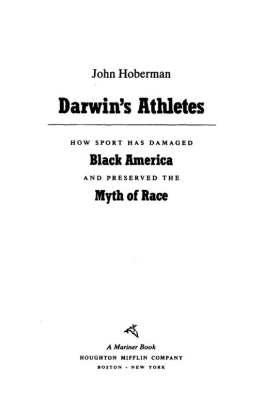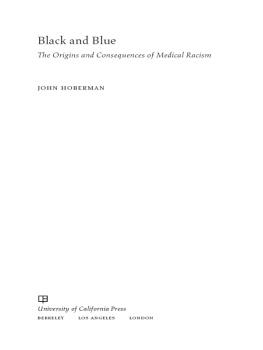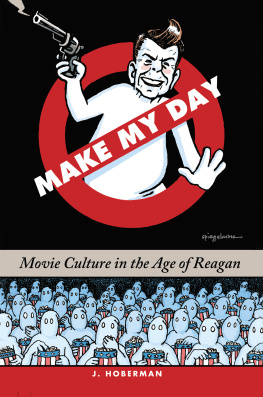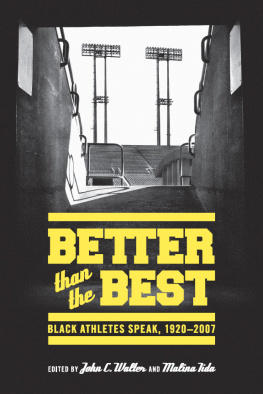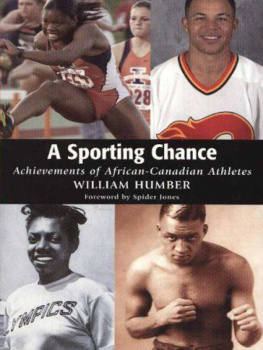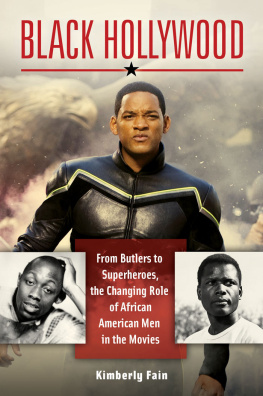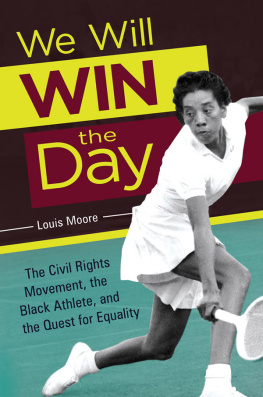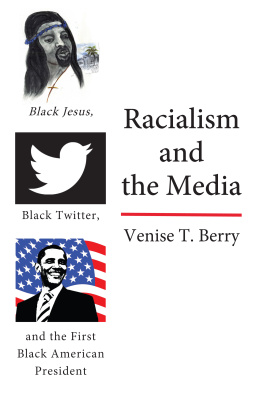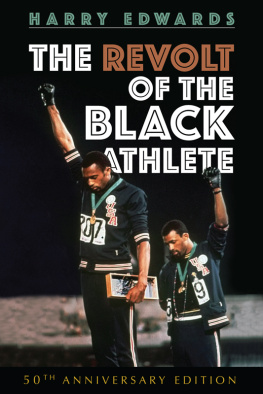HOW SPORT HAS DAMAGED
Black America
AND PRESERVED THE
Myth of Race
A Mariner Book
HOUGHTON MIFFLIN COMPANY
BOSTON NEW YORK
Copyright 1997 by John Hoberman
All rights reserved
For information about permission to reproduce selections
from this book, write to Permissions,
Houghton Mifflin Company, 215 Park Avenue South,
New York, New York 10003.
Library of Congress Cataloging-in-Publication Data
Hoberman, John M. (John Milton).
Darwin's athletes : how sport has damaged black America and
preserved the myth of race / John Hoberman.
p. cm.
Includes bibliographical references (p. ).
ISBN 0-395-82291-2
ISBN 0-395-82292-0 (pbk.)
1. Afro-American athletesPublic opinion. 2. Public
opinionUnited States. 3. Stereotype (Psychology) in sports.
4. Afro-AmericansAttitudes. 5. United States
Race relations. I. Title.
GV 583. H 6 1997
796'.089'96073 dc20 96-36170 CIP
Printed in the United States of America
Book design by Robert Overholtzer
6 7 8 9 10 DOH 12 11 10 9
This book is
dedicated to the memory
of
RALPH ELLISON
Acknowledgments
Many people have contributed to the making of this book. I would like to thank Lincoln Allison, Katie Arens, Cara Aver hart, John Bale, Bjrn Barland, David Black, Claud Bramblett, David Broad, Lindsey Carter, Mike Fish, Alan Goodman, Edmund T. Gordon, Allen Guttmann, David Hoberman, Henry Hoberman, M.D., Craig Hodges, Richard Holt, Philip Houghton, Tim Hutton, Grant Jarvie, Andrew Jennings, Bruce Kidd, Tim King, William Kraemer, Sigmund Loland, John Loy, Robert Malina, Jonathan Marks, Charles Martin, Dennis McFadden, Patrick Miller, Lesley Nye, Robert Nye, Jeffrey Sammons, Clark T. Sawin, M.D., Lawrence Schell, Yevonne Smith, Waneen Spirduso, Melbourne Tapper, Rick Telander, John Valentine, David Wiggins, John Williams, Bruce Wilson, and Charles Yesalis.
Among this group, I am particularly grateful to those colleagues who read, assessed, and criticized portions of the manuscript. It goes without saying that I bear full responsibility for the text, which benefited so much from their efforts. Special thanks go to my research assistant, Laura Issen, whose hard work and initiative made a real difference to this book.
I would also like to thank the many students who took my course "Race and Sport in African-American Life" at the University of Texas, and in particular those who shared with me their personal knowledge and experiences regarding race relations and racialistic thinking.
To my editor, Steve Fraser, I convey my deepest thanks for his unwavering commitment to a project whose potential value he saw from the very beginning. Steve's enthusiasm and intellectual companionship are what made this book possible.
And once again I thank my wife, Louisa, for the patience and generosity she has shown in the course of a long project.
I PROPOSE THAT WE VIEW
THE WHOLE OF AMERICAN LIFE
AS A DRAMA
ACTED OUT UPON THE BODY
OF A NEGRO GIANT.
Ralph Ellison, Shadow and Act
Contents
PREFACE TO THE MARINER EDITION /
PREFACE /
INTRODUCTION: FLYING AIR JORDAN:
The Power of Racial Images /
I. Shooting Hoops Under the Bell Curve
I. THE AFRICAN-AMERICAN SPORTS FIXATION /
2. JACKIE ROBINSON'S SAD SONG:
The Resegregation of American Sport /
3. JOE LOUIS MEETS ALBERT EINSTEIN:
The Athleticizing of the Black Mind /
4. THE SUPPRESSION OF THE BLACK MALE ACTION FIGURE /
5." WRITIN' IS FIGHTIN' ":
Sport and the Black Intellectuals /
II. Prospero and Caliban
Sport as Racial Competition
6. WONDERS OUT OF AFRICA /
7. THE WORLD OF COLONIAL SPORT /
9. THE FASTEST WHITE MAN IN THE WORLD /
III. Dissecting John Henry
The Search for Racial Athletic Aptitude
10. IMAGINING THE BLACK ORGANISM /
11. THE NEGRO AS A DEFECTIVE TYPE /
12. AFRICAN-AMERICAN RESPONSES TO RACIAL BIOLOGY /
13. BLACK "HARDINESS" AND THE ORIGINS OF MEDICAL RACISM /
14. THEORIES OF RACIAL ATHLETIC APTITUDE /
15. ATHLETICIZING THE BLACK CRIMINAL /
16. THE FEAR OF RACIAL BIOLOGY /
NOTES /
BIBLIOGRAPHY /
INDEX /
Preface to the Mariner Edition
The publication of Darwin's Athletes in early 1997 set off a national debate that lasted for months and has now begun to reverberate in the pages of academic journals. Widespread media interest in the book led to dozens of radio, television, and newspaper interviews that provided millions of people in the United States and Canada with a rare opportunity to ask themselves some basic questions about the racial dimensions of the modern sports world: What accounts for "black dominance" in so many popular sports? Have we overestimated the value of racially integrated sport? What price have African Americans paid for their image as "natural" athletes? Why does the racial division of labor in the world of sport continue to concentrate power in white hands?
The publicity surrounding this book was intensified by two virtually simultaneous events that focused public attention on the role of the black athletic hero in American life: the fiftieth anniversary of Jackie Robinson's breakthrough into major-league baseball and Tiger Woods's dramatic victory at the Masters golf tournament. The celebration of one legendary figure appeared to prefigure the birth of another, as Americans indulged once again in the time-honored fantasy that black athletic heroism can inspire the racial healing that has eluded generations of dedicated reformers. The origins and consequences of this popular fantasy (as well as other seductive illusions about the social value of integrated sport) are discussed at length in this book. Indeed, the book's reception owes much to this skeptical appraisal of the black athlete's role as a promoter and beneficiary of social healinga skepticism that blacks and whites are likely to find equally distressing from their respective positions within our society's uneasy racial truce.
It is hardly surprising, then, that responses to the book reflected this distinction between "black" and "white" perspectives. At a time when black and white New Yorkers, for example, cannot agree on any major issue whatsoever, including the quality of the city's drinking water, it should come as no surprise that responses to Darwin's Athletes divided in significant ways along racial lines. It would be fair to say that the white reviewers who appreciated this book evinced an excitement, and at times an exuberance, about its contents that their black colleagues have not and probably could not share. I can only thank (among others) the journalist who found the book both riveting and full of moral energy, its "biting gladiator's prose relentlessly cutting racists down to size." I am similarly grateful to reviewers who called the book "provocative, disturbing, important," and "brutally honest." For these readers, at least, the book provided the exhilarating (and at times dismaying) ride its author had intended for a general audience unaccustomed to heretical ideas about the racial dimensions of sport.
At the same time, Darwin's Athletes may disappoint white (and black) readers bent on confirming the existence of alleged racial differences which have excited the popular imagination for centuries. Two such reviewers felt positively betrayed by a book that perversely refuses to announce the long-awaited scientific confirmation of black athletic superiority. Alas, as the third section of the book amply demonstrates, such evidence does not yet exist, even if lopsided disparities in certain athletic performances suggest this.
Next page
